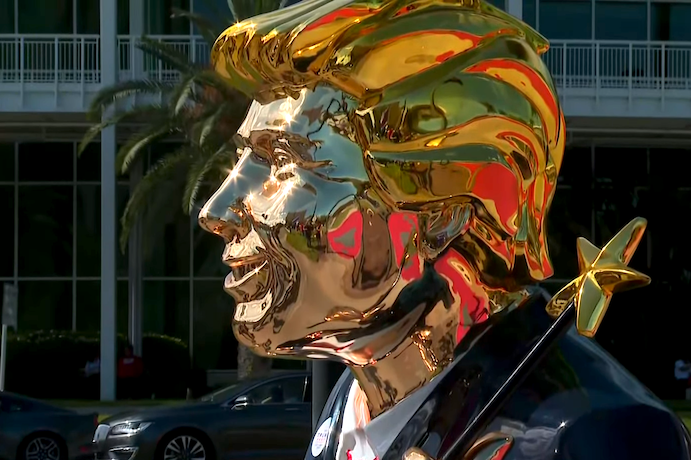Last week’s historic verdict is worth rehearsing. On May 30, Donald J. Trump became the first former president to be convicted of a crime. Twelve ordinary citizens unanimously found Trump guilty on 34 felony counts of falsifying business records in an attempt to conceal hush money he paid to a porn star with whom he allegedly had an affair—all driven by a desire to protect his 2016 presidential campaign.
Following the verdict, Speaker of the House Mike Johnson, who had already made a public pilgrimage to the New York courtroom to undermine the legitimacy of the trial while the jury was still considering evidence, continued to defend Trump and called for the US Supreme Court to “step in.” Here’s the full context from an interview he gave Friday on Fox & Friends:
There’s a lot of developments yet to come, but I do believe the Supreme Court should step in, obviously, this is totally unprecedented…. I think that the Justices on the court – I know many of them personally – I think they are deeply concerned about that, as we are. So I think they’ll set this straight…. It’s going to take a while … this will be overturned, guys, there’s no question about it, it’s just going to take some time to do it.
Johnson’s boasts of personal relationships with and open partisanship among US Supreme Court justices is deeply troubling. It builds on the legitimacy problems the nation’s highest court is facing in the wake of the recent stories that Justice Alito flew flags representing support for the January 6th insurrection and White Christian nationalism at his primary residence and a beach house. That revelation, in turn, amplified previous confirmations that Justice Thomas’s wife Ginni Thomas was deeply involved in efforts to overturn the results of the 2020 election to keep Trump in office.
But on Saturday, ahead of a Republican fundraiser event in Peoria, Johnson said something even more disturbing in his continued defense of Trump. Trump, Johnson said, “is not just our nominee, not just an individual running for president. I think now he’s seen as a symbol, a symbol of one who is willing to fight back against that corruption, the deep state and all the rest.”
Given any number of other statements by Johnson, this comment may seem unremarkable. But the transformation of Trump from a person to a symbol is the key to understanding the power of the MAGA movement and the internal logic of the upside-down world where a unanimous guilty verdict in a fair trial results in solidified support, record fundraising, and desperate Christian defenses of a convicted felon. [On the latter, see Al Mohler, president of the SBC’s flagship seminary: “Say what you will about Donald Trump and his sex scandals, he doesn’t confuse male and female.” Also, see “From Fox News to the Far(ther) Right — Calls for Violence and Retribution Follow Trump Verdict“]
Sociologists have used the term “totem” to describe the way symbols come to have a powerful unifying effect among groups. This week, it struck me that this passage in Emile Durkheim’s The Elementary Forms of Religious Life vividly captures the internal dynamics of the circus-like Trump events that have become the mainstay of the MAGA movement.
Now the totem is the flag of the clan…. [The participant] does not know that the coming together of a number of men associated in the same life results in disengaging new energies, which transform each of them. All that he knows is that he is raised above himself and that he sees a different life from the one he ordinarily leads. However, he must connect these sensations to some external object as their cause. Now what does he see about him? On every side those things which appeal to his senses and strike his imagination are the numerous images of the totem…. Placed thus in the centre of the scene, it becomes representative.
The sentiments experienced fix themselves upon it, for it is the only concrete object upon which they can fix themselves. It continues to bring them to mind and to evoke them even after the assembly has dissolved, for it survives the assembly, being carved upon the instruments of the cult, upon the sides of rocks, upon bucklers, etc. By it, the emotions experienced are perpetually sustained and revived.

Deus Vult, An Appeal to Heaven, and other flags among the crowds at the US Capitol on January 6, 2021. Image: Uncivil Religion, The Smithsonian Institution and the University of Alabama.
The MAGA movement, more than any in my adult lifetime, has spawned a multitude of transgressive and aggressive symbols. The proliferation of flags alone is remarkable: the ubiquitous blue Trump 2020, the “Trump is My President, Jesus is My Savior,” and the thin blue line. These commune with older flags resurrected with new meaning, such as the Tea Party’s “Don’t Tread on Me,” the insurrectionist’s inverted US flag, and the Christian nationalist’s “An Appeal to Heaven.” And they whip alongside White supremacist flags that still mean what they have always meant, such as the Confederate flag and even Nazi flags.
Beyond the banners, a gleaming golden idol made in Trump’s image appeared at a 2021 Conservative Political Action Conference (CPAC), clad in a coat and tie paired with American flag shorts and flip-flops, holding the US Constitution in one hand and a magic wand in the other. At the individual level, a plethora of hats, t-shirts, bumper stickers, digital art (often featuring Jesus and Trump), tattoos, and, of course, Trump’s “God Bless the USA”-branded Bible flooded into public spaces.
This explosion of symbolic material was the result of the energy unleashed by the Big Bang of the MAGA movement. Yet, this chaotic cloud of symbols are only mediating objects of devotion, held in loose orbits around the gravitational force of Trump, transposed from man to totem.
It’s true that every presidential candidate becomes, to some extent, a symbol. We read into their biographies and project onto their bodies a broader set of principles, values, and worldviews. But typically, in healthier times than ours, the connection between a candidate’s character and actions on the one hand, and their idealized symbolic projection on the other, remains visible and therefore functional. An illicit affair, a divorce (or two), business fraud, a racist remark, denigrating the sacrifices of fallen soldiers, insensitively mocking a disabled person—any significant misstep may be enough to break the magical, often fragile social spell that binds the person to the symbol.
Authoritarian rulers such as Trump, however, perform a sleight of hand that simultaneously hides the distinction between candidate and symbol and fuses that projection with the state. As Ruth Ben-Ghiat, author of Strongmen: Mussolini to the Present and the Lucid Substack newsletter, notes, an essential attribute of authoritarian rule is “the leader’s claim that he does not just represent the nation, as do democratic heads of state, but embodies it and bears its sorrows and dreams.”
Trump has consistently sought to make this classic authoritarian move. During his acceptance speech at the 2016 Republican National Convention, Trump claimed, “I am your voice.” In 2019, Trump called himself “the chosen one.” More recently, Trump transposed his own criminal trial into the persecution of his followers, saying:
I’ve been very busy fighting and, you know, taking the, the bullets, taking the arrows. I’m taking ’em for you. And I’m so honored to take ’em. You have no idea. I’m being indicted for you…. And never forget our enemies want to take away my freedom because I will never let them take away your freedom. And I’m never gonna let it happen. They wanna silence me because I will never let them silence you. And in the end, they’re not after me. They’re after you. I just happen to be standing in the way.
When the leader becomes the totem, no transgression is capable of separating him from his acolytes. A totem can’t lie or be vulgar. A totem doesn’t have marriage vows that can be violated. A totem can’t sexually assault a woman. A totem can’t commit fraud. A totem can’t betray an oath to the Constitution. A totem has no innate human characteristics at all. It’s a mirror, reflecting back the collective fears and aspirations of the group, who both generate its image and receive it back reinforced.
Mike Johnson is wrong about the legitimacy of the trial, but he’s right that Trump has become for his followers much more than a political candidate. And this is why Trump the totem, much more than Trump the man, poses such a unique danger to democracy and the rule of law.
This article was originally published on Robert P. Jones’s #WhiteTooLong Substack. Read more here.





